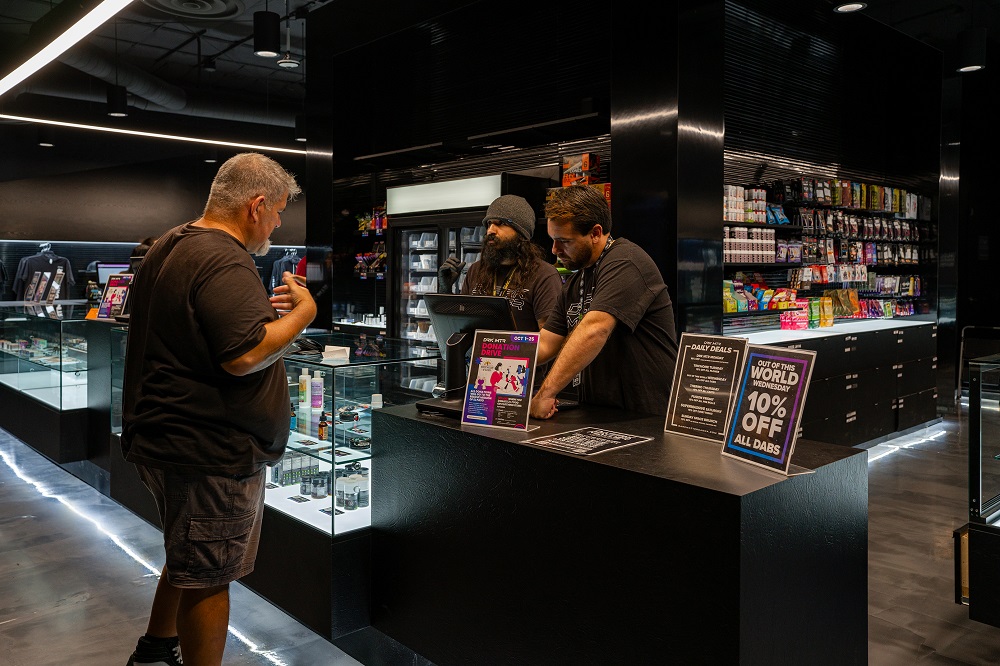
An inside look at Dark Matter Cannabis in Sunland Park, New Mexico, one of the company’s two dispensaries in the state.
We’ve all heard the famous real estate saying: Location, location, location. It’s the answer to the question: What are the three most important things to consider when evaluating real estate? And it’s becoming increasingly obvious in the cannabis industry that those three words are more important than ever. Case in point: Matt Chadwick, who we’ve profiled a couple times in recent years.
Matt predicted that Idaho — a famously conservative state — would not legalize adult-use marijuana like neighbors Washington, Oregon and Montana. Turns out he was right. Matt proceeded to launch Top Crop Cannabis Co. in Ontario, Oregon, a small town on the Idaho border, about 50 miles from Boise. Paying attention to established rules of retail, he focused on the basics: a convenient location with easy access and parking, a friendly and knowledgeable staff, great selection, competitive pricing and a store that was clean, well-lit and eminently shoppable. In no time, Top Crop became the No. 1 volume store in the entire Northwest, beating out other retailers in Washington and Oregon that consistently sold over $1 million per month. By the end of its first year in Ontario, Top Crop was selling at a rate of $95 per transaction and averaging 800 customers a day. It’s still the No. 1 volume store in the four-state Northwest region.
History repeats itself.
When New Mexico legalized adult-use cannabis, Matt saw a big opportunity and decided to open a dispensary in Sunland Park, New Mexico. Never heard of Sunland Park? Me neither. Turns out the small community is walking distance from the Texas border and the greater El Paso metropolitan area, home to about 1.5 million cannabis hungry Texans. Matt launched Dark Matter Cannabis and now has the top producing dispensary in New Mexico, serving close to 1,000 customers a day.
At Marijuana Venture, our focus has always been on business and helping those jumping into this industry to become successful. Matt Chadwick and his team are the epitome of smart businesspeople who took the long view and carefully thought about this industry. They ignored the hype and focused on tried and proven operating principles. They resisted the urge to jump in willy-nilly and instead did extensive research. That approach paid off, and the team created sales juggernauts.
It’s worth repeating what I’ve said so many times in the past: avoid the snake oil folks at the big cannabis circus trade shows who promise the moon. Forget the hype about “can’t miss easy money,” dismiss the people who proclaim cannabis to be a once-in-a-lifetime opportunity. And most importantly, do your homework.
There are many other people like Matt who are profitable and doing well. Some might even be “crushing it” — to use a well-worn phrase. But for every Matt, there are dozens of people who missed the mark, believed the hype, didn’t do their homework or made bad hires and deals.
So here, again, are a few choice suggestions distilled down from nine years of watching the legal cannabis business evolve in Washington and the rest of the legal states:
- Do your homework. To that end, I strongly suggest you visit one or more of the legal states that have been at it for a while. Washington and Colorado were the first to legalize adult-use cannabis. They have different rules and regs. Washington doesn’t have vertical integration, Colorado does. Washington has a much bigger selection of products and cheaper prices than Colorado (competition naturally increases without vertical integration). Both states have robust businesses that have evolved over the past decade. Tour both, and if you can’t visit Washington or Colorado, visit Oregon, Arizona, Alaska or Nevada. You’ll find out what the business is really like and the challenges it presents. You’ll hear about low margins, high taxes, bad deals, long hours and bad hires. You’ll get the straight scoop, not some phony trumped up hype from a slick salesman at MJBizCon.
- Hire carefully (and fire fast). Almost all the successful operators in the cannabis industry in the legal states that have been at it for a while learned the hard way that “master growers” from the pages of High Times are useless when it comes to running a big, legal ag operation. Managing a commercial greenhouse takes specific skills often learned at schools like the University of Arizona. On the retail side, hire people with retail experience. It’s far easier to teach someone about cannabis than it is to teach someone the skills needed to run — and manage — a profitable store or chain of stores.
- Seek the advice of professionals. Good lawyers and accountants with a cannabis business focus might cost you a bit up-front, but they can also — and in this business regularly do — save you a huge amount of money and headaches down the road. I can’t begin to count the number of bad deals I’ve seen in the cannabis business: former partners who hate each other, lawsuits, theft, family members who lost homes, bankruptcies and other assorted problems. Most could have been avoided with good legal advice, well-written contracts and a third-party review.
Finally, be ready to work long hours. Every single operator I know who’s seen some measure of success in the cannabis industry got there by working long hours and putting in the proverbial “elbow grease” needed to achieve success. Cannabis might sound sexy, but it’s no different from any other ag-based retail business: It’s a lot of work!

